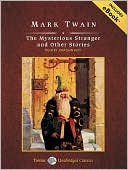

 |

|

The average rating for The Mysterious Stranger and Other Stories based on 2 reviews is 3.5 stars.
Review # 1 was written on 2008-12-28 00:00:00 Rochelle Dworetsky Rochelle DworetskyI've always heard that Twain became increasingly bitter and misanthropic towards the end of his life, but I didn't understand how true that really was until I read The Mysterious Stranger. In this posthumously published novella, a sleepy Austrian village is visited by Satan, an angel who is the nephew of the more famous, evil Satan. Satan in some ways acts as a mouthpiece for Twain, objectively pointing out how the human race is defined by fear, lies, betrayal, suspicion, and cowardice; perhaps most people mean well, but like sheep, they simply follow those who seem the boldest. Sadly, the boldest are usually those who have the worst impulses. Twain presents us with the burning of an innocent woman as a witch, the abandonment of a kind family by their friends, and a drunkard beating his loyal dog until the poor animal's eye is smashed out. As Satan observes, don't use the word brutal because brutes (animals) certainly don't act this way. Towards the end, Satan has this bombshell: he doesn't exist, and neither does God--how could there be a greater power when humanity is as sickening and loathsome as it is? All this said, vintage Twain also shows through, in some moments of (dark) humor. My favorite exchange comes when Satan, disguised as a villager, tells a fussy middle-aged woman looking for a husband that his uncle may be interested; when she asks what the uncle does, Satan replies that he has a vast empire down in the tropics! The Mysterious Stranger, as bleak as it is, also has some moments of grace, not letting Satan get in the last word. The boys who hear Satan's pronouncements, do some cowardly things, but their compassion and desire to do right shows through time after time. The fact that they can't understand Satan's objective judgements on humanity is to their credit--their emotions and desire to better themselves are what help them transcend the sordidness around them. |
Review # 2 was written on 2009-03-21 00:00:00 Tommy Johnston Tommy Johnston"The Mysterious Stranger," closer in size to a novella, takes up more than half of the book. It is the real gem of this collection and for me, by far, the best piece here. (The four stories in this Dover Thrift Edition, a very easy to find edition btw, span Twain's earliest popularity to his last days, and have greed as a common theme.) "The Mysterious Stranger" is a very odd story. Satan (or, at least his minion nephew, a surrogate dark angel as presented here) is more or less the hero; humankind and religion come in for a deserved blistering drubbing for the race's cruelty, ignorance and hypocrisy. The story takes place in Austria in 1590; it's told from the viewpoint of a boy (actually a grown man reminiscing), who along with his friends are dazzled by and befriended by Satan; they come to realize that Satan is more an observer and agent than a purposely malicious being - sort of the way predators are in the wild. It is only man who preaches morality and in the same breath commits malicious, sadistic cruelty with relish. Morality, ostensibly good, brings with it judgment - and from that rationalizing all manner of righteous brutality. Those with the "moral sense" (humans) are seen as less than beasts, because beasts do not judge. I was perplexed a bit by a writerly conundrum raised by the piece, and that's that witchcraft is sort of mocked as bogus (and Satan, nee Twain, mocks the torturers of witches), and yet Satan is, in fact, practicing withcraft through the whole village, materializing riches and changing people's fates. There is obviously metaphysical intervention going on, so the townspeople actually have some basis for their belief, even though they really don't know it. Or there are those who do, but chose to deny it when money comes their way. It seems religion takes a back seat when cash enters the picture. Evil being the source matters not to those profiting. The story has all the satirical strengths of Twain at his best, masterful storytelling chops and some truly weird and wonderful fantasy conceits --- interwoven with perhaps pedantic, but very powerfully stated arguments about the pettiness of humanity. His analysis of the mob mentality that leads to war sounds eerily like the post-911 era. OK, well the more famous earlier short stories in this collection I found less satisfying. "The Celebrated Jumping Frog of Calaveras County," the early work that put Twain on the map, is a bit weak now. The punchline is mild and the lead-up is a bit padded. "The $1,000,000 Bank Note" is pretty good. The idea of two rich guys pulling a bum off the street and betting how he will behave or survive reminds me of movies such as "Trading Places" that have similar premises. It too has prescience: the idea of being *perceived* as having real wealth, and the access to all privileges engendered is not so dissimilar to the phony perceptions of wealth of Enron and the dotcom era. "The Man That Corrupted Hadleyburg" has an excellent premise and great ideas, about the deeply rooted corruption of a town whose corruption finally boils to its seemingly pristine surface, but I felt Twain's execution was poor and the story is woefully confusing. I have to admit I bailed on it and may have to retry it another time. It goes against my stickler policy to mark this as "read" since I did bail on one of the stories, but I must move on... The real four-star gem here is "Mysterious Stranger." |
CAN'T FIND WHAT YOU'RE LOOKING FOR? CLICK HERE!!!